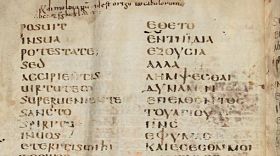324. United We Fall: Latin Philosophy in Byzantium
Thomas Aquinas finds avid readers among Byzantines at the twilight of empire, and is used by both sides of the Hesychast controversy.
Themes:
• G.H. Demacopoulos (ed.), Orthodox Readings of Augustine (New York: 2008).
• E. Fisher, “Planoudes, Holobolos, and the Motivation for Translation,” Greek, Roman, and Byzantine Studies 43 (2002), 77-104.
• D.J. Geanakoplos, Byzantine East and Latin West: Two Worlds of Christendom in Middle Ages and Renaissance (New York: 1966).
• T. Kolbaba, The Byzantine Lists: Errors of the Latins (Urbana: 2000).
• S. Papadopoulos, "Thomas in Byzanz: Thomas-Rezeption und Thomas-Kritik in Byzanz zwischen 1345 und 1435," Theologie und Philosophie 49 (1974), 274-304.
• M. Plested, Orthodox Readings of Aquinas (Oxford: 2012).
• N. Russell, “Palamism and the Circle of Demetrios Cydones,” in C. Dendrinos et al. (eds), Porphyrogenita: Essays on the History and Literature of Byzantium and the Latin East in Honour of Julian Chrysostomides (Aldershot: 2003), 153-74.
• D. Searby (ed.), Never the Twain Shall Meet? Latins and Greeks Learning from Each Other (Berlin: 2017).
• K.M. Setton, “The Byzantine Background to the Italian Renaissance,” Proceedings of the American Philosophical Society 100 (1965), 1-76.
• I. Ševčenko, “The Decline of Byzantium Seen Through the Eyes of Its Intellectuals,” Dumbarton Oaks Papers 15 (1961), 169-86.
• M. Trizio, “Alcune osservazione sulla ricezione bizantina del De trinitate di Agostino,” in A. Rigo and P. Ermilov (eds), Byzantine Theologians: the Systematization of their own Doctrine and their Perception of Foreign Doctrines (Rome: 2009), 143-68.







Comments
Thank you
Re your Introductory comments in the prior podcasts. In view of what I have read of Plested's book (referenced above), the 1277 condemnations and Mark Jordan's remarks in his Teaching Bodies on the limited immediate reception of Aquinas within the Dominican order itself, one could almost draw an exaggerated conclusion that he was more enthusiastically appropriated by Byzantium than in the West during this period. I still think the tone of the Aquinas podcasts were disproportionately more critical than in any other thinker of the period though. I have always wondered why that was so.
In reply to Thank you by Theodore Ross
Aquinas
Yes, I think that might be true - or at least, we could say his impact in the east is usually underestimated (indeed unknown) and in the west overestimated.
I actually just read the Aquinas episodes/chapters again because I am reading the page proofs for the Medieval Philosophy volume (I mean, I literally read them today). Aquinas actually doesn't come in for that much criticism from me, as such, but I do emphasize that other thinkers of the time opposed him on a number of issues. I think that fits my goal pretty well, as far as I remember: I actually love Aquinas but I was trying to push against the Aquinas-centric approach usually taken to medieval thought. So I wanted to point out that he is not, like, the definitive scholastic thinker but actually a bit of a rogue Aristotelian, in his context.
Add new comment